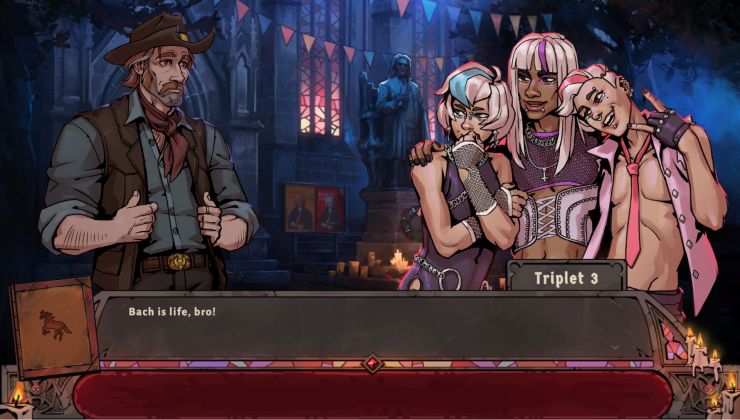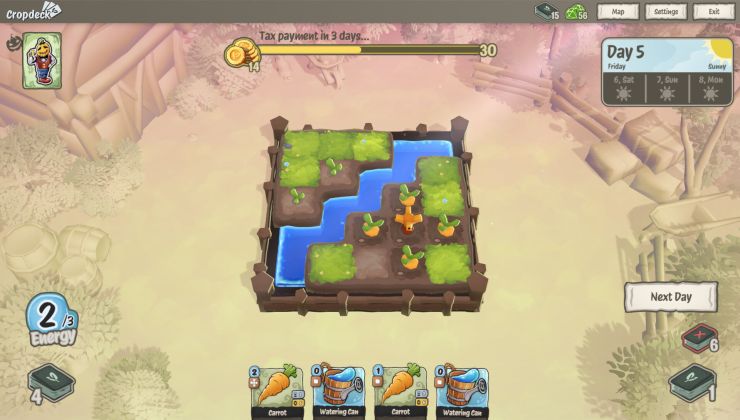While Steam continues to do well with it being the most popular games store, it seems CD PROJEKT Group's store GOG is really starting to struggle.
CD PROJEKT recently released their latest financial results, along with a call with investors that went over how the whole business is doing. It's not all bad news for them, since they saw overall 38% more sales revenue compared to the third quarter of last year. On the GOG side though, it posted increasing losses and so it's going to be restructured.
Over the current year to date it appears GOG has seen losses of about $2.21 million, which is pretty bad considering the 1.37 million they gained during the same period last year.
They've said that GOG "should focus more on its core business activity - which means offering a handpicked selection of games with its unique DRM- free philosophy" and so there's going to be some changes to the GOG team, with some moving over instead to CD PROJEKT RED. Additionally, they've "initiated reorganization of GOG’s operations" to focus on the "core business" and they're hoping this will "improve its financial effectiveness in 2022".
It's not really surprising, when you think that Epic Games continue to desperately try and turn a profit by pulling more customers to their store and even they don't expect to turn a profit until at least 2024.
What is really bad for me is that always people tend to compare to Valve, Valve is a monopoly in the gaming scene, they can do whatever they want whenever they want it. They have the 75% market share on 2013 and the number are not open (Is a for profit company after all, and doing really good).
The really important thing is that we need diversity, we need more stores that give us choices. That's what good for us the consumers, and yes easy is good but sometimes is Free as in Beer nothing more.
I bought multiple games from Steam in the past, but upon realising that you are only buying a licence and that even backing up the games still requires Steam and an infrequent connection to Steam's servers to play them, kind of put me off from Steam (I realise some games are DRM-Free on Steam, but getting some of them to run is a real faff). I need to have the option to download and backup the games I own to a local drive.
Not to be dismissive of Valve, I am very grateful for the upstream contributions they have made to the Linux Kernel, the WINE Project, MESA development and more - I hope that continues. If Valve made the switch and removed the majority of DRM on their games, I would only buy through Steam, to be sure of that.
Currently, I donate the money I would use to buy some games to the WINE Project itself and any other Linux distro/open source software that I use. In my opinion, they need the money more than an $8 billion dollar corporation like Valve.
Back to GOG though:
GOG/CD Projekt Red, I really hope the following gets addressed (for your sake if nothing else):
- GOG Galaxy Linux Client - I find it very difficult to believe that after years of selling Linux versions of games on GOG, that we still don't have a Linux client. While the website interface is usable enough, it is painful trying to download games unless you use a client like Lutris or MiniGalaxy.
- Contributions to Linux upstream - I feel that GOG would get a lot more credibility, certainly in the Linux community (just look at what Valve has done), if they used some of their clearly talented staff to contribute upstream to projects that use/connect to GOG or its games (like the WINE Project).
- Better Regional Pricing - More currencies need to be supported on GOG, I currently have to buy my games in dollars (with whatever exchange rate I am given).
Aside from that, the store and my library is easy enough to navigate and as I mentioned before, DRM-Free is the way to go in my opinion.
They started out as an old games store and no-DRM was them trying to stand out and was fitting for their catalogue where publishers wouldn’t be adamant about protecting their investments.
The lines are all blurred now with new games on GOG and old games on Steam and Steam is winning.
But I bet Steam isn’t winning because it has first-class Linux support. In fact, the only reason they do so much for Linux is because they can afford it and someone decided Windows’ monopoly needs to be broken and that is the real reason Valve deserves our (Linux users’) support. For now.
I'd like a competitor to Steam.
What would be the benefit of that?
Less costs for devs/publishers. I know AAAs usually csn easily afford that and still make millions, but indies often can't really afford it.
And besides that?
What has always been the benefit of competition for the consumer? It forces companies to continue to improve, or lose customers to their competition. With little or no competition, a company can basically abuse the hell outta their customers, and nobody can do jack about it. For examples of this behavior, look to Microsoft, Google, Facebook, Xfinity, and many others who abuse the hell out of their monopoly (or near monopoly) positions in the "marketplace" and notice how they get away with some of the shadiest practices simply because the lack of competition for people to switch to gives them that ability.
Or... the competition comes in and in the worst case scenario, forces a company to cut down costs and the service becomes worse as a result of that. Do you want that?
It's always this mantra that competition is great... when the status quo is pretty damn good. Steam is getting 20 years old soon. Has Valve ever exploited their situation? Did they ever raise the cut they demand? Did they ever make it worse for customers? No, they improved.
Because they have a philosophy that works and makes sense. They understand that this is a symbiotic relationship... and that's good.
Steam is getting 20 years old soon. Has Valve ever exploited their situation? Did they ever raise the cut they demand? Did they ever make it worse for customers? No, they improved.
Because they have a philosophy that works and makes sense. They understand that this is a symbiotic relationship... and that's good.
In the vast majority of cases competition is great because in the vast majority of cases people almost always abuse a position of "power" or "dominance". However, I gotta totally agree with you on your assessment of Valve/Steam. I was not a real fan of them at first (way back in the time before…) but they really have in large part just continued to improve.
Sadly, all potential competition has chosen not to even try to compete on merit at all, by creating an equivalent or superior product/service. While Valve earns their 30% cut in a variety of ways that make it more than deserved, companies like Epic take pot shots at them for charging "too much", and play lame exclusivity games with developers and customers, while not offering even a fraction of the functionality, capability, or services Valve has.
But I'm on Linux now, and GOG is no longer an option. Valve caters to me, now a Linux user, through Steam. GOG does not cater to Linux users like me. The choice is, shall they say, obvious.
Steam is getting 20 years old soon. Has Valve ever exploited their situation? Did they ever raise the cut they demand? Did they ever make it worse for customers? No, they improved.
Because they have a philosophy that works and makes sense. They understand that this is a symbiotic relationship... and that's good.
In the vast majority of cases competition is great because in the vast majority of cases people almost always abuse a position of "power" or "dominance".
This competition often leads to awful working conditions, because companies need to cut costs to stay profitable (or because they are super greedy). Amazon (and many many others) abuse their position of power and that is with competition. They are dominant and they can do whatever they want.
The end goal doesn't need to be communism... that's not great either, but I'm not sure that competition is such a good thing. In a competition there are always losers - when there is no need for that in the first place.
Steam is the closest thing to a neutral market place. The only thing I wish they could/would do is open it up for other big studios with an API or whatever so that they all use the same infrastructure, but share the costs or whatever.
Steam is getting 20 years old soon. Has Valve ever exploited their situation? Did they ever raise the cut they demand? Did they ever make it worse for customers? No, they improved.
Because they have a philosophy that works and makes sense. They understand that this is a symbiotic relationship... and that's good.
If I understand something of USA laws, had they rised their cut over the years that would have indeed resulted into an illegal monopoly case right away. But when Epic arrived they felt the pressure to even lowered fees for large publishers. That closes any possible claim of monopoly in front of any court.
Though I would have much preferred if they instead walked the irreverent Apple way. Reduce indeed the fees but only for small indies.
But when Epic arrived they felt the pressure to even lowered fees for large publishers. That closes any possible claim of monopoly in front of any court.
Valve never lowered the fees for large publishers. They lowered the fees for EVERYBODY who made a certain amount of money - and that was announced before the EGS was announced. Maybe they heard some industry chatter, but there were no signs of that.
But when Epic arrived they felt the pressure to even lowered fees for large publishers. That closes any possible claim of monopoly in front of any court.
Valve never lowered the fees for large publishers. They lowered the fees for EVERYBODY who made a certain amount of money - and that was announced before the EGS was announced. Maybe they heard some industry chatter, but there were no signs of that.
"EVERYBODY who made a certain amount of money" doesn't make it large publishers? Without mass investments into commercials it's hard to consistently make "certain amount of money" in any business. Let alone a overcrowded business like VGs. And that is essentially publishers business and role in the industry.
I remembered that EGS was not open but already announced. I might be wrong. But if they did it before EGS was announced, that would make a monopoly case even weaker: there was already enough competition to put them under pressure even before Tim crusade. Now it might not even be worth considering.
Last edited by Mal on 1 Dec 2021 at 3:45 pm UTC
"EVERYBODY who made a certain amount of money" doesn't make it large publishers? Without mass investments into commercials it's hard to consistently make "certain amount of money" in any business. Let alone a overcrowded business like VGs. And that is essentially publishers business and role in the industry.
Stardew Valley
"EVERYBODY who made a certain amount of money" doesn't make it large publishers? Without mass investments into commercials it's hard to consistently make "certain amount of money" in any business. Let alone a overcrowded business like VGs. And that is essentially publishers business and role in the industry.
Valheim or Stardew Valley... no big publishers or whatever. They made enough money to get a bigger percentage of sales numbers. Other big games fail. You say it like it's a default... that big publishers already get a bigger cut, when that's just not the case. Valve made no deals for anybody.
I remembered that EGS was not open but already announced. I might be wrong. But if they did it before EGS was announced, that would make a monopoly case even weaker: there was already enough competition to put them under pressure even before Tim crusade. Now it might not even be worth considering.
It was before the EGS was announced. Just by a few days, but it was before... as I said, maybe they heard something through the grapevine, but I can't make a judgment there.
https://www.theverge.com/2018/11/30/18120577/valve-steam-game-marketplace-revenue-split-new-rules-competition
https://www.unrealengine.com/en-US/blog/announcing-the-epic-games-store
Last edited by kuhpunkt on 1 Dec 2021 at 4:08 pm UTC
I'm not saying that indies can't sell millions. Most of those who did I bought a copy as well so I know (including stardew). But they are not consistent. It's a combination of having a good game, healthy PR and be a little lucky with network effect. But just a 0.0x% of all of them makes it. They win the lottery.
While for big publishers it's the opposite. They run commercials everywhere and they sell millions even with a broken or boring game. Then they might call "underperforming title" and in extreme cases not even recoup the costs of the commercials. But to not hit the threshold is just a 0.0x% of all the titles they publish. Publishers are consistent, because that's how all business survives the "natural selection".
Lowering the fees for low sales titles would mean that more indies can have another shot to the moon or can have a less hard life while they try their best to make somethign good. Lowering fees for big sales titles may benefit the occasional Barone out there (and I'm happy for him, he deserves), but mostly help investors in large publishers. I don't think I have to come here and enumerate how many exceptional launches of AAA games resulted in mass burnouts and firings in the ranks in the last years.
And I say this with candid honesty. I too work with professionalism (hoping to not burnout or be fired after doing all I can to meet deadlines) and I too invest my little savings (in hope of largest return as possible). I'd hate to be exploited as a worker as much as being exploited as an investor.
Oh come on. Don't point the exception to the rule and call it the norm. :D
Even if true - it still has nothing to do with your claim that Valve lowered the fees for big publishers. They didn't. They still have a 30%/70% share.
Well, I hope everyone here is aware that the problems GOG has have absolutely zero to do with the (non)existence of a Linux client. The percentage of Linux users there is unlikely much different from the Steam one, and a 1% unhappy customers won't cause such a loss....True enough. I think people are just sort of saying "I know I ought to be upset about the no-DRM store having problems, but this is why, from a Linux perspective, I don't much care."
Even if true - it still has nothing to do with your claim that Valve lowered the fees for big publishers. They didn't. They still have a 30%/70% share.
Fine. I'm out.
Last edited by Mal on 2 Dec 2021 at 12:14 am UTC
Oh come on. Don't point the exception to the rule and call it the norm. :D
Even if true - it still has nothing to do with your claim that Valve lowered the fees for big publishers. They didn't. They still have a 30%/70% share.
But they did. In 2018, they reduced their fees for big publishers (technically any game over $10M sales is reduced). What am I missing here?
https://www.theverge.com/2018/11/30/18120577/valve-steam-game-marketplace-revenue-split-new-rules-competition
Edit:
Wait, just re-read - are you (kuhpunkt) suggesting that it's technically not a price reduction for big publishers because like 2 indies managed to make $10M of sales!?!
Haha - okay then. Yeah, I'm with Mal. They reduced their prices for big publishers, make no mistake. The fact that a couple of indie lottery winners benefited as well is of no relevance. It was done to appease the big guns and honestly, it's probably the only reason we're seeing Origin games back on Steam. I also believe it's the only reason we're seeing some Sony titles on there too. Their motivation here was clear. I'm gobsmacked you're arguing such a technicality.
Last edited by scaine on 1 Dec 2021 at 11:59 pm UTC
Oh come on. Don't point the exception to the rule and call it the norm. :D
Even if true - it still has nothing to do with your claim that Valve lowered the fees for big publishers. They didn't. They still have a 30%/70% share.
But they did. In 2018, they reduced their fees for big publishers (technically any game over $10M sales is reduced). What am I missing here?
https://www.theverge.com/2018/11/30/18120577/valve-steam-game-marketplace-revenue-split-new-rules-competition
Edit:
Wait, just re-read - are you (kuhpunkt) suggesting that it's technically not a price reduction for big publishers because like 2 indies managed to make $10M of sales!?!
Haha - okay then. Yeah, I'm with Mal. They reduced their prices for big publishers, make no mistake. The fact that a couple of indie lottery winners benefited as well is of no relevance. It was done to appease the big guns and honestly, it's probably the only reason we're seeing Origin games back on Steam. I also believe it's the only reason we're seeing some Sony titles on there too. Their motivation here was clear. I'm gobsmacked you're arguing such a technicality.
It's not a technicality. There is a 30%/70% cut for everybody. If they had reduced the fees for big publishers like you say, they would have a 20%/80% cut as a default. That is not the case. How can you claim that they reduced the fees when they didn't?
If anything, you could say that they introduced a tiered system that favors big publishers - but they still have to earn that higher tier.
Last edited by kuhpunkt on 2 Dec 2021 at 8:05 am UTC
Then Humble. OK, they're not dead, they still lurk around like a Zombie, selling Steam keys. Pitiful fate for a former spearhead of DRM-free and platform-independent gaming....
Slightly OT - This change didn't happen because of Steam actually, Humble sold themselves to IGN in late ~2017 which is when things started to change with them.
And of course (OK, IMHO) it was a consequence of / reaction to the competition from Steam. If only because developers lost interest....
Yeah I don't agree with that, but (OK, IMHO too) I think it was more a matter of the market flooding with indie bundles from them and others. The quality of games dropped substantially, and it didn't take long for people to get sick of their libraries filling up with, how do I put this, "crap". Humble and others did take steps to combat this issue, once people stopped buying bundles because they were bundles, by breaking them out into individual keys once purchased; however, even then people were and still do get turned off by just having an abundance of junk keys.
I know whenever someone brags about the size of the libraries, someone always asks (pretty quickly) how much of it is junk from indie bundles. And they're usually not wrong either.
It's unfortunate that that stigma regarding junk keys was created, because I'm sure there are legitimately good or even great indie games that get passed over due to immediately looking like bundle filler and never being given a chance. Especially since sometimes they are junk bundle filler.











 How to set, change and reset your SteamOS / Steam Deck desktop sudo password
How to set, change and reset your SteamOS / Steam Deck desktop sudo password How to set up Decky Loader on Steam Deck / SteamOS for easy plugins
How to set up Decky Loader on Steam Deck / SteamOS for easy plugins
See more from me